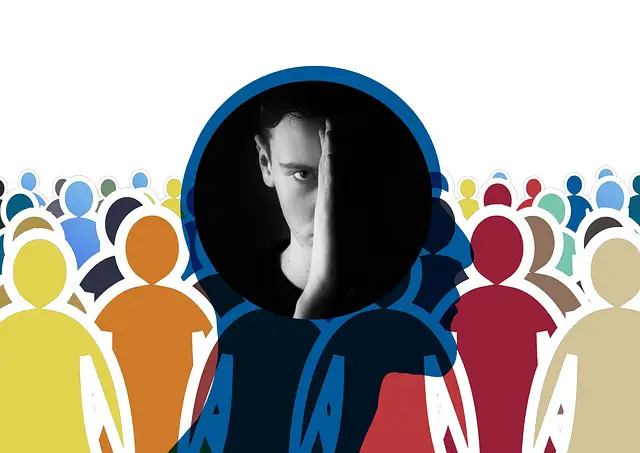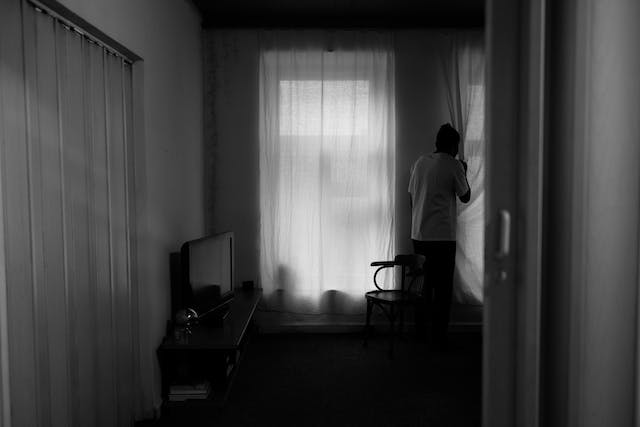Agoraphobia involves fear of open spaces or situations, limiting mobility. Social anxiety disorder is fear of social scrutiny, hindering interactions in various settings.
TL;DR Agoraphobia Vs. Social anxiety disorder
Agoraphobia revolves around the fear of situations or places where escape might be difficult or embarrassing. This can lead individuals to avoid crowded areas, public transportation, or even leaving their homes altogether.
Social anxiety disorder centers around a fear of being judged or humiliated in social settings, which may result in avoiding parties, speaking in public, or engaging in conversations.
What is Agoraphobia?

Agoraphobia is an anxiety disorder characterized by an intense fear of situations or places where escape might be difficult or embarrassing. People with agoraphobia often avoid crowded spaces, open areas, or situations that might trigger panic attacks.
This fear can lead to significant limitations in daily life, impacting a person’s ability to work, socialize, or even leave their home. While it often coexists with panic disorder, agoraphobia can also manifest independently.
Treatment may involve therapy, medication, and gradual exposure to feared situations to help individuals regain confidence and overcome the fear associated with specific environments or circumstances.
What is Social Anxiety Disorder?

Social Anxiety Disorder (SAD) is an intense and persistent fear of being judged, criticized, or embarrassed in social situations.
Individuals with SAD may experience extreme anxiety in everyday interactions, leading to avoidance of social activities. Symptoms include blushing, trembling, or cognitive distress. SAD can impair personal and professional relationships, limiting one’s ability to participate in social events.
It often begins in adolescence and may accompany low self-esteem. Treatment may involve therapy, such as cognitive-behavioral therapy, and medication to manage symptoms, enhance coping strategies, and improve overall social functioning.
Agoraphobia Vs. Social anxiety disorder – Key differences
| Criteria | Agoraphobia | Social Anxiety Disorder |
|---|---|---|
| Fear Focus | Fear of situations where escape may be difficult | Fear of negative judgment or scrutiny in social situations |
| Key Triggers | Open spaces, crowds, public transportation | Social interactions, scrutiny, performance situations |
| Avoidance Behavior | Avoidance of specific places or situations | Avoidance of social events, gatherings, or interactions |
| Impact on Daily Life | Limits mobility and outdoor activities | Impairs social interactions, relationships, and work |
| Onset | Often associated with panic disorder | May begin in adolescence, sometimes with low self-esteem |
| Physical Symptoms | Panic attacks, trembling, sweating | Blushing, trembling, cognitive distress |
| Treatment Approaches | Exposure therapy, medication, cognitive-behavioral therapy | Cognitive-behavioral therapy, medication, exposure therapy |
| Example Situation | Avoiding crowded places or public transport | Fear of speaking in public, attending parties, or meeting new people |
| Common Comorbidities | Panic disorder | Depression, low self-esteem |
| Focus of Fear | Escape and physical safety | Social evaluation and negative judgment |
Symptoms and Triggers of Social Anxiety Disorder
Excessive Worry: Persistent and intense worry about upcoming social events or interactions.
Physical Symptoms:
- Trembling or shaking
- Sweating
- Blushing
- Rapid heartbeat
- Nausea or stomach discomfort
- Muscle tension
Cognitive Symptoms:
- Fear of negative judgment
- Overanalyzing social interactions
- Negative self-talk
- Intense fear of embarrassment or humiliation
Avoidance Behavior:
- Avoidance of social events or situations
- Difficulty initiating or maintaining conversations
- Isolation or withdrawal from social activities
Impact on Daily Life:
- Impaired academic or work performance
- Difficulty forming and maintaining relationships
- Low self-esteem
Triggers of Social Anxiety Disorder:
Performance Situations:
- Public speaking or presentations
- Performing in front of others
- Meeting new people
Social Interactions:
- Attending parties or gatherings
- Initiating or participating in conversations
- Dating or romantic situations
Authority Figures:
- Interacting with supervisors or authority figures
- Being observed or evaluated
Routine Activities:
- Eating or drinking in public
- Using public restrooms
- Making phone calls in front of others
Educational or Professional Settings:
- Participating in class or work meetings
- Group projects or collaborations
Unfamiliar Environments:
- Fear of judgment in unfamiliar or new places
- Difficulty navigating through crowded spaces
Physical Appearance:
- Fear of being scrutinized for physical appearance
- Avoidance of situations that draw attention to oneself
It’s important to note that symptoms and triggers can vary among individuals with social anxiety disorder, and the severity of symptoms may differ. Treatment, such as cognitive-behavioral therapy (CBT) and medication, can be effective in managing social anxiety. Seeking professional help is recommended for an accurate diagnosis and appropriate intervention.
Symptoms and Triggers of Agoraphobia
Intense Fear: Experiencing intense fear or anxiety in specific situations where escape might be difficult or help might not be available.
Avoidance Behavior:
- Avoidance of places or situations perceived as difficult to escape from.
- Reluctance to leave the safety of one’s home.
Anxiety or Panic Attacks:
- Episodes of anxiety or panic attacks when facing feared situations.
- Symptoms may include trembling, sweating, shortness of breath, or a sense of impending doom.
Dependence on Others:
- Reliance on others for assistance or companionship when venturing outside the home.
Isolation:
- Social isolation and withdrawal from activities outside the home.
Physical Symptoms:
- Palpitations or increased heart rate.
- Dizziness or lightheadedness.
- Upset stomach or gastrointestinal discomfort.
Cognitive Symptoms:
- Fear of losing control.
- Fear of having a panic attack in public.
Triggers of Agoraphobia:
Open Spaces:
- Fear of open spaces, such as parks, malls, or large public areas.
Crowded Places:
- Anxiety in crowded places, like shopping centers or public transportation.
Traveling Alone:
- Fear of traveling alone, especially long distances.
Enclosed Spaces:
- Anxiety in enclosed spaces, like elevators or movie theaters.
Leaving Home:
- Difficulty leaving the safety of one’s home.
Fear of Being Alone:
- Anxiety about being alone without immediate assistance or support.
Fear of Medical Emergencies:
- Concern about experiencing a medical emergency without help nearby.
Past Trauma:
- Agoraphobia may be triggered by a history of trauma or panic attacks.
Unfamiliar Environments:
- Discomfort in unfamiliar environments or places.
Public Speaking or Performance:
- Anxiety about being in situations where one may be observed or evaluated by others.
Agoraphobia can significantly impact a person’s daily life, leading to social and occupational impairment. Treatment may involve cognitive-behavioral therapy (CBT), exposure therapy, and medication to alleviate symptoms and improve functionality in various environments. Seeking professional help is crucial for accurate diagnosis and tailored intervention.
Image Credits
Featured Image By – Photo by cottonbro studio
Image 1 By – Photo by cottonbro studio
Image 2 By – Gerd Altmann from Pixabay








